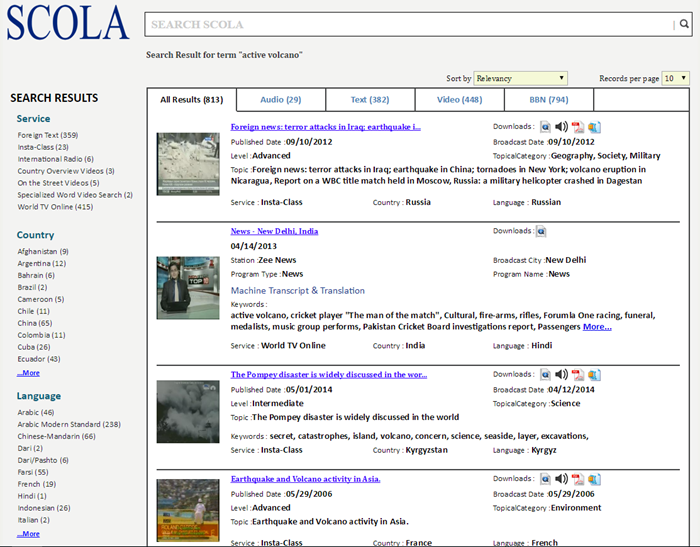Increasing Demand for Enterprise Search Solutions
SCOLA (Satellite Communications for Learning), a nonprofit educational organization, has been devoting itself to foreign language learning through the largest repository of foreign language media in the world, in an effort to help people learn more about each other, their cultures, their languages, and their ideologies. But to achieve this mission, they needed an enterprise search tool so the organization implemented Attivio's enterprise search functionality to enable subscribers to find any content in any language.
 CMS-Connected has reached to Jane Zupan, Sr. Director of Product Marketing at Attivio, and she stated: “SCOLA's team quickly recognized the value of making their unique information assets easily available for their subscribers and the importance of a fluid user experience. Attivio is pleased to power the search functionality for their site.”
CMS-Connected has reached to Jane Zupan, Sr. Director of Product Marketing at Attivio, and she stated: “SCOLA's team quickly recognized the value of making their unique information assets easily available for their subscribers and the importance of a fluid user experience. Attivio is pleased to power the search functionality for their site.”
SCOLA provides a wide range of online language learning services, including 85 terabytes of video, audio, and text-based content in 200 languages. The organization houses the largest repository of foreign language media in the world, which makes it harder to deliver the right content to their clients with an easy, engaging customer experience. In this regard, the organization had a unique challenge, given that it has:
To get over this challenge, SCOLA chose Attivio Enterprise Search as the platform to help the community find information across all formats, languages and geographical regions in the blink of an eye by typing a single keyword. Non-text media such as videos go through a machine translation process, while for other items, the translation and metadata are provided by SCOLA’s international network of content contributors. In the end, the Attivio software indexes the content from the translation provided by a combination of technology and human intervention. Here’re the changes SCOLA has seen since they implemented Attivio Enterprise Search:
-
35% increase in site usage
-
Average time on site increased from 45 minutes to 75 minutes
-
Extremely positive feedback, influencing customer retention

"When you have 84,000 videos in 200 languages, trying to find the right content for a themed lesson is overwhelming," said Maggie Artus, Project manager at SCOLA. "With the Attivio search function, the user only sees instant results. The behind-the-scenes processing complexity is completely hidden." She also explained the process with an example: “Let’s say you’re a teacher creating a lesson around weather. Now, thanks to this search functionality, you can type in that keyword and search across all content -- such as video programs, newspaper reports, and radio -- for anything related to that category. You can filter the results by content type, language, country, and service. It’s a much more robust and dynamic user experience.”
Here’s Joe Lichtman, Vice President Product Management at Attivio, talking about Attivo as the semantic Data Catalog for EMC:
Global Enterprise Search Market
We all are very used to being able to easily locate relevant data through Google in our personal lives. That’s why it causes frustration when this ease of search is not replicated in our professional lives. In other words, Google elevated user expectations, and enterprise search is expected to follow suit.
Enterprise Search has been around since the 1960s when IBM developed an early internal search engine. The quality in the field of enterprise search has dramatically increased since the second half of the 2000’s when the niche search companies were acquired by the giants of software:
-
Microsoft acquired FAST Search in 2008.
-
Adobe acquired Mercado in 2009.
-
Dassault Systèmes acquired Exalead in 2010.
-
Hewlett Packard acquired Autonomy in 2011.
-
Oracle acquired Endeca in 2011.
-
IBM acquired Vivisimo in 2012.
The global enterprise search market generated revenues of more than $1.47 billion in 2012 and is expected to reach USD 8.90 billion by 2024, according to a new study by Grand View Research, Inc. Given the mass amount of data at our disposal today, searching for specific files or folders alone will no longer satisfy an increasingly millennial-dominated workforce. They have a lower tolerance for hassle and expect to get results that look less like a page of links and more like answers to a question.
I couldn't agree more with the definition by John Felahi, Chief Strategy Officer at Content Analyst Company, as he believes that for most people, search is a simple word or two in a search box, or voice command, to get results back for three basic actions below:
-
I know what I am looking for. Find it for me.
-
I know the parameters of what I am looking for. Help me focus on the right set of content/items.
-
Help me find content on this topic so I can learn more or see what is available.
Today, enterprise users expect instant searching of public Internet and Intranet data, extending from both static content like HTML, XML/XSL, and PDF, to dynamic content like SharePoint, PHP or ASP.NET. Users also expect instant, simultaneous search access to email messages along with multilayered embedded attachments.
Google, Inc. (Google Search Appliance), HP Autonomy (Verity), SharePoint Search, and IBM are the leading players dominating the market. The North American region is driving the market with the largest share due to an early adoption of the technology. In the future, Europe is expected to experience higher growth due to the entry of multiple American players in the European countries.
When we look at the future of “search”, it's safe to say that auto-classification products, which can generate descriptive metadata automatically based on an analysis of the document’s unstructured content, are one of the most emerging trends. Another emerging functionality that we will see in the future is proactive intervention. It means that search will no longer be driven by the searcher as the machine will learn and push out what the user needs as they grow in their relationship with the platform.
To learn more on Enterprise Search from the experts, join CMS-Connected aboard The Liberty Fleet of classic schooners in Boston Harbor with show host’s Scott Liewehr and Tyler Pyburn, as they examine how your website should be helping people seek the information they need from anywhere, in any format, by organizing the retrieval of structured and unstructured data using enterprise search.

Also in this episode, Laura Myers from Falcon-Software will shine her spotlight on Sitecore, a global leader in customer experience management.

Venus Tamturk
Venus is the Media Reporter for CMS-Connected, with one of her tasks to write thorough articles by creating the most up-to-date and engaging content using B2B digital marketing. She enjoys increasing brand equity and conversion through the strategic use of social media channels and integrated media marketing plans.